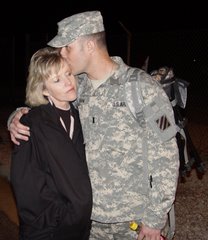 Soldiers who participated in the 3rd Heavy Brigade Combat Team’s Native American Indian Heritage ceremony stand at attention while Spc. Latonya Burden, from Clarksville, Tenn., Headquarters Company, 3rd Brigade Special Troops Battalion, sings the national anthem during a Native American Heritage ceremony held Nov. 30 in the dining facility at Forward Operating Base Hammer, Iraq.
Soldiers who participated in the 3rd Heavy Brigade Combat Team’s Native American Indian Heritage ceremony stand at attention while Spc. Latonya Burden, from Clarksville, Tenn., Headquarters Company, 3rd Brigade Special Troops Battalion, sings the national anthem during a Native American Heritage ceremony held Nov. 30 in the dining facility at Forward Operating Base Hammer, Iraq. Pfc. Richard Smith, from Eagle Butte, S.D., Headquarters Battery, 1st Battalion, 10th Field Artillery, sings a ceremonial song in the Wanbli Paha language native to his tribe during a Native American Heritage ceremony held Nov. 30 in the dining facility at Forward Operating Base Hammer, Iraq. Smith is part of the Cheyenne River Sioux tribe. Third Heavy Brigade Combat Team Chaplain (Maj.) Timothy Sowers, from Atchison, Kan., watches the singer.
Pfc. Richard Smith, from Eagle Butte, S.D., Headquarters Battery, 1st Battalion, 10th Field Artillery, sings a ceremonial song in the Wanbli Paha language native to his tribe during a Native American Heritage ceremony held Nov. 30 in the dining facility at Forward Operating Base Hammer, Iraq. Smith is part of the Cheyenne River Sioux tribe. Third Heavy Brigade Combat Team Chaplain (Maj.) Timothy Sowers, from Atchison, Kan., watches the singer.3rd HBCT Public Affairs
FORWARD OPERATING BASE HAMMER, Iraq – Soldiers of the 3rd Heavy Brigade Combat Team celebrated American Heritage Month Nov. 30 in the dining facility at Forward Operating Base Hammer.
During the dinner and ceremony, speakers and singers honored those 3rd HBCT Soldiers whose ancestry traces back to the Native Americans. The theme of the celebration was “Honoring Warriors: Past and Present.”
At the start of the ceremony, Mistress of Ceremony, Sgt. 1st Class Cassandra Welter, from Sheridan, Wyo., Company A, 3rd Brigade Special Troops Battalion, introduced Spc. Latonya Burden, from Clarksville, Tenn., Headquarters Company, 3rd BSTB, who sang the national anthem.
After an invocation given by 3rd HBCT Chaplain (Maj.) Timothy Sowers, from Atchison, Kan., a speech was given about Native American Indian Medal of Honor winners.
“In the 20th century, five American Indians have been among those Soldiers to receive the United States’ highest military honor,” said Sgt. Brian Gonzalez, from Providence, R.I., Co. A, 3rd BSTB. “These warriors exhibited extraordinary bravery in the face of the enemy and, in two cases, made the ultimate sacrifice for their country.”
Gonzalez went on to read short biographies of Jack C. Montgomery, Ernest Childers, Van Barfoot, Mitchell Red Cloud, Jr., and Charles George. He explained how each Soldier went above and beyond the call of duty for the welfare of his fellow comrades and his country.
Following Gonzalez, Pfc. Jason Jones, from Logan, Utah, Company B, 203rd Brigade Support Battalion, gave the audience a brief lesson on the Navajo Code Talkers of World War II.
“The idea to use Navajo for secure communications came from Philip Johnston, one of the few non-Navajos who spoke the language fluently,” Jones explained. “Johnston believed Navajo answered the military requirement for an undecipherable code because Navajo is an unwritten language of extreme complexity.”
Jones went on to explain that one estimate indicated less than 30 non-Navajos could understand the language. None of those non-Navajos were Japanese, making it the perfect code for World War II.
Pfc. Richard Smith, from Eagle Butte, S.D., Headquarters Battery, 1st Battalion, 10th Field Artillery, sang a song in the Wanbli Paha language native to his tribe. Smith is part of the Cheyenne River Sioux tribe.
The ceremonial song is sung when a tribe member receives an eagle feather, the greatest honor a Native American can receive, Smith said.
“The song translates to ‘I give you this feather to honor you for what you are doing,’” Smith explained. “In the second verse I said, ‘I give this nation this feather.’ And in the third verse I sang, ‘I give this warrior this feather.’”
Smith said feathers are given for various accomplishments such as completing a journey or duty, or for cultural dancing and singing.
“I have about 40 or 50 eagle feathers,” he said. “I am very proud of my heritage. I speak my language fluently, I participate in every ceremony, I sing, I dance.”
Smith explained he joined the Army to fulfill his warrior journey, a task required by his culture.
After Smith sang, Maj. Dewey Boberg, from Anaheim, Calif., 3rd HBCT executive officer, awarded certificates of appreciation to Soldiers who contributed to the ceremony.
“Native Americans have an awesome history, an awesome ancestry and a very vibrant culture,” Boberg said.
The 3rd HBCT, 3rd Infantry Division, Fort Benning, Ga., has been deployed in support of Operation Iraqi Freedom V since March.





No comments:
Post a Comment